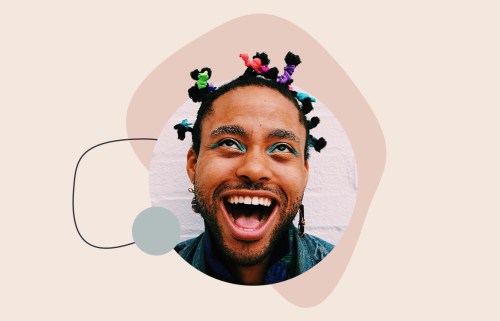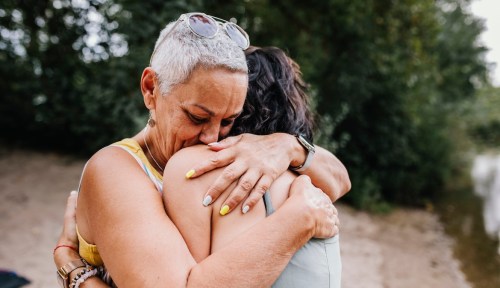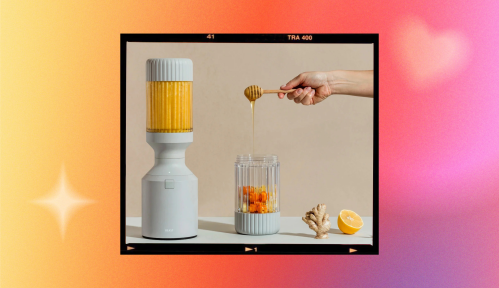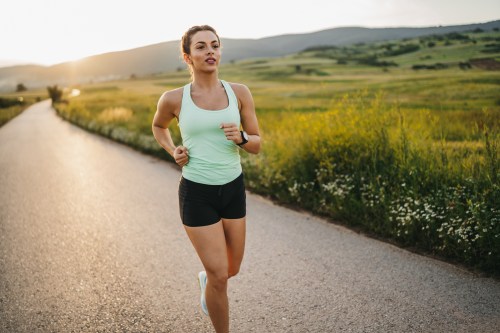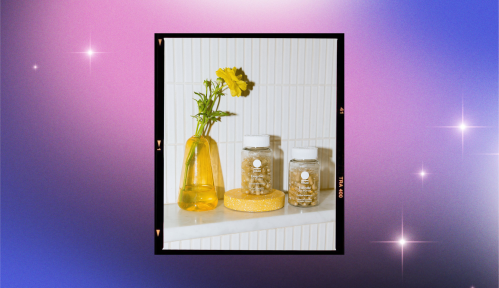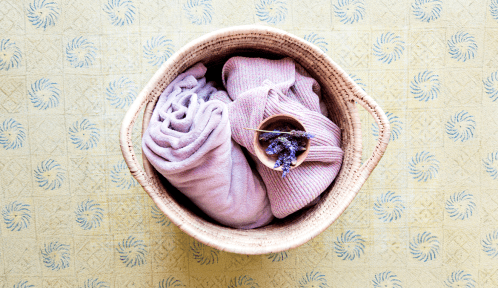When Jordi left their hometown of Los Angeles to attend drama school at Carnegie Mellon University at age 18, they hoped to not only expand their acting skills—the stage was the only place they’d ever felt truly safe and free—but to grow as a person, too. Instead, they were taught to shrink themselves.
Experts in This Article
intuitive and spiritual coach
“I was met with a lot of systemic oppression,” says, Jordi, who ticks off the “points of opposition” they had with their teachers: their Blackness, their queerness, their femininity, which teachers often tried to get them to minimize so as to become more marketable as an actor. “I definitely [had to] shield myself from femme-phobia, transphobia, and racism in that space.” And afterwards, they were left to navigate the lasting trauma of that experience.
Now, Jordi won’t be diminished, and they have made it their mission to help others who have been marginalized safely reclaim their space. To this end, Jordi’s expansive and expanding collection of hats includes spiritual guide, intuitive, voice coach, stylist, performance artist, author, creative director (for Radimo LA, an agency aiming to increase the representation of marginalized individuals in media, entertainment, and advertising), and—above all—activist.
Finding strength in numbers
Jordi had been exposed to wellness practices early—their mom was a fan of aromatherapy and affirmations—but it wasn’t until they returned to Los Angeles after drama school that they began to more fully immerse themselves in order to address their trauma. “That work was highly internal,” they say. An education in chakras and sound healing and color therapy and meditation commenced. An altar was built. Journals were kept. “Developing a habit around my own healing really allowed me to flourish,” they say.
After stitching together enough income sources (slinging ramen, caring for children, and substitute teaching at a school they’d once attended) to support themselves, they moved out of the family home and in with a roommate. “It was in this space that I really felt like a portal was opened,” they say. “I was able to share some of my healing practices with [my roommate] and they really resonated with her. We were able to communicate about what we were learning about the world, about our beliefs, about healing practices.”
The same summer, Philando Castile and Alton Sterling were killed by police officers within 24 hours of each other. “The news of that really shook me. I felt debilitated,” Jordi says. Then, they were invited to a Black Lives Matter gathering. “It was the most people I’d ever been around—over 1,000 people in the street,” they say. “I was just so overwhelmed, I dropped to the floor and I was crying, just to see the magnitude of that meeting, how people could gather and support to heal around trauma and violence. It was very deeply affirming.”
“I was just so overwhelmed, I dropped to the floor and I was crying, just to see the magnitude of that meeting, how people could gather and support to heal around trauma and violence.” —Jordi, healer and activist
That experience initiated Jordi into the world of community organizing, but, sadly, it wouldn’t be long before another tragedy illuminated how important collective action would come to be in their life.
After it was announced that the Los Angeles Police Department cop who shot and killed Redel Jones, a Black woman, would not be prosecuted, organizers decided to camp out in front of City Hall in protest. Jordi joined them—sleeping in a tent on site for 28 days. “I was meeting so many new people and talking and communing and listening to the stories of the elders, listening to the stories of the youth,” they say. “And in that space, I was able to practice all of the things that I was developing in my internal healing practice and share that within the community.”
In other words, they graduated from self-healer to a healer of others. “I showed up there with my crystals and with my sound bowls. I knew I needed to be well in that space, and I knew how to be well in any space. People really resonated with my energy,” they say. “People said, ‘I’m so thankful you’re here,’ and started to name me as a witch doctor, name me as a healer.”
This community of activists also saw–and named—Jordi’s truth in another way: “They named me as a nonbinary person before I ever identified in that way,” they say. “It was really awakening and illuminating.”
But while identifying as nonbinary and trans was another positive step on Jordi’s path to healing, it was not great for their other passion: acting. Auditions fell away. When they were called into a room, it was to read for characters who were being murdered or beaten, or who were taking drugs. “It was taxing,” they say. “[Right now], my existence is revolutionary. When I walk down the street, I shift people’s realities because they have never seen me before—my image, my expression isn’t mainstream. So I am definitely unicornized. I am this mythical creature that exists once in a blue moon, and I want that to be shifted.”
Once again, however, community stepped in to expand Jordi’s expression of self; they joined a collective of Black trans and nonbinary femmes called #SNATCHPOWER in creating performance art. “That weaving of my own queer-trans identity into the realms of performance really reinvigorated a question that I was asking myself about how I show up in the arts industry and in Los Angeles with this new identity, in a space that really doesn’t seem to be making space for me,” they say. If Hollywood wasn’t the place for them, Jordi realized, the world contained many other stages.
They began working consistently as a performance artist while delving deeper into healing practices and activism through organizations like the Stop LAPD Spying Coalition, Dignity and Power Now, and Familia TQLM. Jordi held retreats for the latter, where they helped to heal queer, trans, non-binary individuals who’d been recently released from ICE detention centers. Jordi also became a board member of Dive in Well, an organization committed to making the wellness industry more equitable and inclusive.
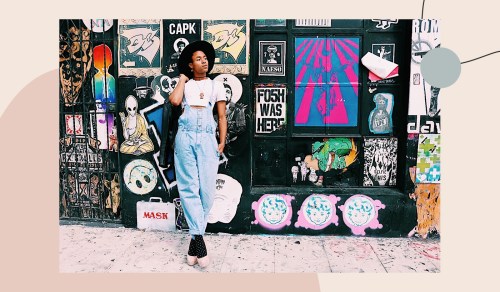
It takes a village to heal
As Jordi has found time and time again, healing is a symbiotic relationship between a person and the communities to which they belong. “Healing does not exist in a void because we do not exist in a void,” they say. “A lot of times, especially within ‘Western’ society, if you’re unwell, that becomes a threat to your productivity, your ability to work or provide value as a citizen. There’s this narrative that we have to get our prescription, go home, close our doors, and come out when we’re all good, which is perpetuating a cycle of sickness.” This leads people to suffer in silence, Jordi says, citing the actor Chadwick Boseman, who recently died of colon cancer without telling anyone except an intimate group of family and friends, as an example. “The most important aspect of healing is being able to be in community and share the load and share information,” they say. “It really does take a village to heal.”
And at the same time, the healing of communities requires individual action. “If we see a community that is experiencing sickness, how can we show up for this community, not just [once], but as a continual practice?” Jordi says we need to ask.
“Healing will have to be radically connected to the Earth. As the systems around us crumble, violently, people are getting hurt. We need to ground to find stability.” —Jordi
Over the past six months, Jordi says they’ve seen progress in this area: “Mutual aid. People with resources sharing those resources. Black trans/queer people having their Go Fund Me [campaigns] fully funded. Taking care of each other,” they say. But that’s not enough. “On a larger scale, I want to see CEOs cutting their net worth in half and truly divesting from systems that are continuing harm and investing in organizations that feed communities, and particularly the most vulnerable communities.”
As Jordi’s own winding path exemplifies, they believe healing isn’t a destination. You don’t one day arrive at a “healed place” and dust off your hands. “Healing is almost like a pledge to have a certain perspective about life, no matter what you’re navigating,” they say. “There is no constant that is promised, particularly around comfort or around health. This world, the environment, our bodies…everything is in shift, and healing is a perspective on those shifts wherein we tap into our highest good and our highest purpose in order to be as close to well as we can while we’re alive.”
The next phase of healing for Americans will require a “return to Indigeneity,” Jordi says. The violence of colonialism has stripped individuals of a connection to not only where they come from, but to the land itself. “Healing will have to be radically connected to the Earth,” they say. “As the systems around us crumble, violently, people are getting hurt. We need to ground to find stability.”
To “put [their] feet on the soil,” as they say, Jordi has packed up once again and moved from Los Angeles to New Orleans. In this new space, they hope to be able to have more freedom—of time, of money—to pursue healing work within trans, BIPOC, and undocumented communities. They also plan to continue creating: A text on herbalism (A Lil’ Book of Potions) is imminent, as is a graphic novel. And they hope to find some rest. “I feel like the runt kitten that is trying to nuzzle against my older, more well-fed siblings, banging up against them to finally be able to feed myself,” they say. “That energy is very present in many aspects of my life, so because of that, there is a tiredness. I really want somebody to say, ‘Sit down. Here’s a cushioned seat at the table.'” They’ll be the first to pull out the chair next to them for someone else.
Sign Up for Our Daily Newsletter
Get all the latest in wellness, trends, food, fitness, beauty, and more delivered right to your inbox.
Got it, you've been added to our email list.
